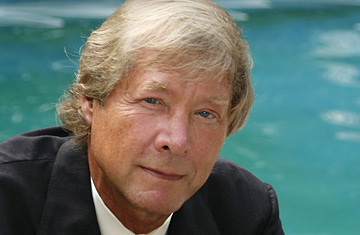
Richard Patterson
Richard North Patterson has his eye on the Presidency. No, he's not declaring for office, although his background as a trial lawyer and a Watergate prosecutor make that a more realistic prospect than you might first think. Instead, the bestselling novelist (25 million books sold worldwide) has written another heart-pounding, ripped-from-the-headlines novel (his 15th), The Race (Holt). Just in time for the 2008 election, Patterson delves into the rough and tumble world of Presidential campaigns. TIME's Andrea Sachs reached Patterson at his home in San Francisco (he splits his time between there and Martha's Vineyard), just before he began his writing day:
TIME: What made you decide to take on the topic of the Presidential race?
Patterson: I describe it as the American odyssey. It's the hardest thing a person can do. It's a gauntlet in which privacy means absolutely nothing. Every aspect of character is exposed, and every decision can destroy a [candidacy], and perhaps even the candidate, in a way that's unique to the merciless public exposure that running for President brings. To me, it's like a courtroom drama intensified. There are always surprises. There are always revelations of character, and nothing is out of bounds. It's great drama.
Your main character, Corey Grace, is a former POW who's a Republican Senator and a presidential candidate. That sounds familiar!
I couldn't have made him up without the example of John McCain, but that said, I want to exempt Corey. He, like my other characters, is very much his own man. His experiences are quite different than John's, and his beliefs as you will note are markedly at variance with John's. John is an example of somebody whose character was formed outside of politics, as was Corey Grace's, which is very interesting. But otherwise, this fellow isn't John McCain any more than he's Bill Cohen [former Republican secretary of defense under Clinton], although he has some similarities to Bill as well.
Are you friends with the two of them?
Yes, they're both good friends.
Are you friends with a lot of political people?
Friends in the sense that we really are friends. Friends is an elastic concept in politics, as you know. But yes, Ted Kennedy and Barbara Boxer are close friends. Congresswoman Stephanie Jones from Cleveland is an old friend. So I learn a lot from them about how this business works, and the cost of it.
Is there something you see in common among the kind of people who take on "the race"?
I think you have to have almost an extra chromosome. You have to have extraordinary dedication and discipline to succeed in politics, because you're never off. You and I can go home, and that's it. But there's no downtime in politics. Things are always happening. You can be confronted by somebody at the supermarket; you lose all privacy. And it's exhausting. John McCain and Barbara Boxer, for two, have a wicked commute just to get back and forth to the Senate. So it takes an extraordinary person. I often say that actually, our politicians deserve a better system than we have, in that the people in office are better than we know. It's the system, the way that we raise money and the way, frankly, that we abuse these people in their private lives, that is so dismal.
Your own career got political when you were a Watergate prosecutor.
Yes, I've always been interested in politics, and I had very early exposure to the stakes involved at the Presidential level when I was sent by the Securities and Exchange Commission to assist in an aspect of the Watergate prosecution. So I've been sort of engaged in things ever since. I was chairman of Common Cause, the public-interest lobby founded by John Gardner, and on the board of Washington advocacy groups which espouse reasonable gun laws, reproductive freedom, women's and family health issues and the like.
